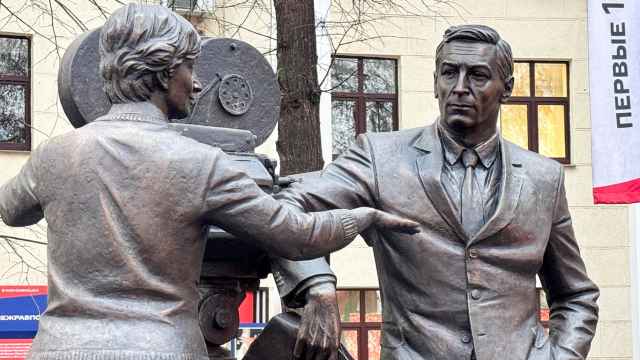I often find myself thinking about Nick Lowe's song, "What's So Funny About Peace, Love and Understanding?" especially the version performed with attitude and passion by Elvis Costello & the Attractions on their 1979 album "Armed Forces." It is one of those songs that can fit all kinds of situations.
This weekend I found myself humming the tune even more frequently than usual. The reason for that was Carrie Thompson.
Carrie started out her adult life studying Russian at the University of Texas in the mid-1990s. While still a student, she traveled to St. Petersburg where she lived and immersed herself in Russian and Russian culture. Later, after graduating, she returned to live and work in Moscow in the photo department of ITAR-TASS.
But it was in 2001, about the time that she moved to New York, that she really began to connect with Russian culture in a big way. That year she joined the staff of the Trust for Mutual Understanding, one of the most active and creative funders of cultural exchange between the United States and Russia. Presently the associate director of the Trust (also known as TMU), Carrie has been instrumental in aiding untold numbers of programs linking Russian and American artists.
TMU, as Carrie informed me, was founded in 1984 on the belief that grants can make a contribution to improved communication, closer cooperation and greater respect between the people of the United States, the Soviet Union and other countries in Eastern and Central Europe by supporting international, face-to-face contact and professional interaction.
What this means is quite simple: If you are an American performer, writer or creator and you have visited Russia on any kind of official exchange, chances are that TMU at least partially made your trip possible. The same may be said for Russian performers, writers and artists who have traveled to and/or worked in the United States. Rare is the Russian event in the United States that does not have some element of backing from the Trust.
Carrie was in Moscow last week to attend the Russian Case festival, a special annual event organized by the Golden Mask Festival that offers a five-day blitz introduction to contemporary Russian theater. After we attended Nikolai Kolyada's production of Tennessee Williams' "A Streetcar Named Desire" at the affiliate of the Pushkin Theater just off Pushkin Square, I asked Carrie to share some of her thoughts on Russian culture.
To hear what she had to say about Boris Eifman, Nikolai Kolyada, Genrietta Yanovskaya and the Trust for Mutual Understanding, click on the photo below.
A Message from The Moscow Times:
Dear readers,
We are facing unprecedented challenges. Russia's Prosecutor General's Office has designated The Moscow Times as an "undesirable" organization, criminalizing our work and putting our staff at risk of prosecution. This follows our earlier unjust labeling as a "foreign agent."
These actions are direct attempts to silence independent journalism in Russia. The authorities claim our work "discredits the decisions of the Russian leadership." We see things differently: we strive to provide accurate, unbiased reporting on Russia.
We, the journalists of The Moscow Times, refuse to be silenced. But to continue our work, we need your help.
Your support, no matter how small, makes a world of difference. If you can, please support us monthly starting from just $2. It's quick to set up, and every contribution makes a significant impact.
By supporting The Moscow Times, you're defending open, independent journalism in the face of repression. Thank you for standing with us.
Remind me later.






